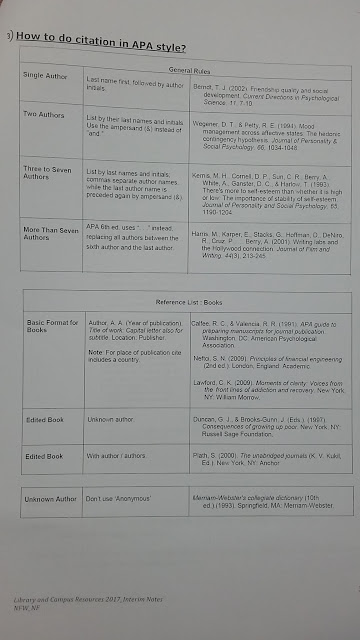MODULE 3
LIBRARY AND CAMPUS RESOURCES
UED 102 STUDY SKILLS
WEDNESDAY, 12 JULY 2017
BY: NORFITRIAH SEMAN
TYPES OF RESOURCES :
TYPES OF RESOURCES
|
EXAMPLE
|
UITM CAWANGAN PAHANG,KAMPUS JENGKA
|
ACADEMIC RESOURCES.
|
Library, information technology & computer, registrar.
|
-Medec.
-Library.
-HEA
HEP
-Computer lab.
-Biology lab.
|
HOUSING, DINING AND TRANSPORTATION RESOURCES.
|
Buses, dining places.
|
-Food court.
-Bus stop.
-Reading room.
-Dobby.
|
STUDENT ORGANIZATION RESOURCES.
|
Extra-curricular, leisure activities.
|
-Tennis court.
-Badminton court.
-Matching field.
-Football filed.
|
10 THINGS YOU MUST KNOW ABOUT AL-BUKHARI LIBRARY :
HOW TO READ A BOOK ?
✨Jose Luis Riechmann, & Frank Wellimer. (2014).
1.OPERATING HOURS.
|
MON – FRI (08.30AM – 18.30PM).
SATURDAY (09.30AM – 18.30PM).
SUNDAY & PUBLIC DAYS (CLOSED).
*If there are examination and need library to open, time will be
considered.*
|
2.BORROWING AND RETURNING BOOKS.
|
-Limit 20 books per student.
(diploma & degree).
-3 books. (pra-diploma).
-Must return within 14 days.
|
3.STEPS ON HOW TO BORROW AND
RETURN BOOKS.
|
-OPAC : ONLINE PUBLIC ACCESS CATALOGUE.
-SHELVES: A - P (1st floor).
Q
-Z (2ND floor).
-Matric card.
-Counter : Borrow and return books.
|
4.FINE.
|
-Fine 20 cents per day.
|
5. LOST ITEMS.
|
-Report to the staff or librarian.
-Gives 14 days to search the books that are missing.
|
6.INTERLIBRARY LOAN.
(ILL)
|
-Need to pay the cost : delivery,
system, charge.
|
7. IT ROOM.
|
-For an hour user.
-Need to recharge or renew : for the next hours.
-PAB 1 : 60 PC.
-PAB2 : 20 PC.
-Do not leave your pendrive.
-Cannot download any software.
|
8.LIBRARY ZONE.
|
-SILENT ZONE : Carar table.
-QUIET ZONE : 0 noise.
-SOCIAL ZONE : Discussion room. ( Book 3 days before).
-TV room.
|
9. i-BOOK KKM.
|
-MODULS:
1. End notes software.
2.Online databases.
3.Research work.
|
10. URL.
|
- FACEBOOK LIBRARY AL-BUKHARI.
- WEBSITE LIBRARY AL-BUKHARI.
- BLOG LIBRARY AL-BUKHARI.
|
HOW TO READ A BOOK ?
💛 Check the table of content.
💛 Search for index on the book.
💛 Read the back of the book / summary.
ACTIVITY :
🚗 Choose 4 books and fulfill the form.
🚗 Read the book correctly and identify : Call number, Table of Content, Index.
🚗 Returning the books .
GROUP : - LAILA SOFEA NASIR BT AHMAD ZAMANI
- SITI INTAN SURAYA BT MAHADI
- SARAH SYAZWANI BT MOHD JOHAN
- SITI NUR ADILLA BT SHAHRUL BAHRIN
NO.
|
BOOK TITLE
|
NO. ACCESSION
|
CALL NUMBER
|
1
|
CELL BIOLOGY
|
92514
|
QH581. M56 2016
|
2
|
RESTORATION ECOLOGY
|
88676
|
QH541.15 R45 R817 2012
|
3
|
MOLECULAR STRESS PHYSIOLOGY OF PLANT
|
88180
|
QK754.M65 2013
|
4
|
FLOWER DEVELOPMENT
|
89800
|
QK653.F589 2014
|
Flower Development : Method and Protocols.
London, England : Human Press.
✨Gyana Ranjan Rout, & Anath Bandhu Ras. (2013).
Molecular Stress Physiology of Plants.
Texas, USA : Springer.
✨Jelte Van Andel, & James Aranson. (2012).
Restoration Ecology : The New Frontier (2nd Ed).
UK : Wiley-Black Well.
✨Mitchell, MG. (2016).
Cell Biology : Translational Impact Incancer Biology and Bioinformatic.
UK : Academic Press.
WHAT IS APA STYLE ?
💚 APA (AMERICAN PSYCHOLOGICAL ASSOCIATION) style is most commonly used to cite sources with within social sciences.
💚 APA Style originated in 1929 when a group of psychologistsconvened and sought to establish a simple set of procedures, or styles, that would codify the many components of scientific writing to increase the ease of reading comprehension.
💚 It concerns uniform use such elements as : - selection of headings, tone, and length;
- punctuation and abbreviations;
- numbers & statistics;
- construction of tables and figures;
- citation of refernces; and
- elements of manuscripts.
💚 APA STYLE rules and guidelines are found in the 6th edition of the publication manual American Psychological Association.







No comments:
Post a Comment